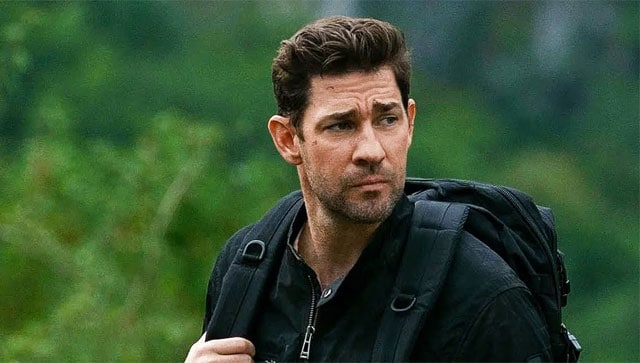In a scene from Prime Video’s Tom Clancy’s Jack Ryan (Season 3), Mike, played by series regular Michael Kelly spells out the riot act for his mate who he has just committed to supporting come what may. “I’m in, I’ve got your back, I just hope we don’t get killed,” he says. “So do I,” Ryan, played by the excellent John Krasinski, responds. It’s a scene that perfectly illustrates what has made this particular series the globetrotting success that it has become. Krasinski was inspired casting for Tom Clancy’s revered creation, but here he has moulded the role to suit the kind of masculinity that fits his feet and body. He still does some of the macho things, just not as elegantly or frenetically as say,more conventional leading men would. The Greer (Wendell Pierce) and Ryan pair return in this third instalment that whispers its politics, holds back on the action, but is breathless nonetheless.
What a time to be doing an espionage thriller. It’s possibly a cynical thought but the Russia-Ukraine war has predictably catalysed its first fiction into reality. Ryan is in Rome, where he lands upon intel that a rogue Russian group intends to execute a series of steps that would strain the relationship between Russia and NATO, leading to a war-like situation and eventually the return of the former USSR. Ryan and the people on the show, call it the ‘Seven Days’ theory. Basically, a cascade of interconnected global events that would lead several countries into war. Ryan, as he always does, follows his gut but happens to pull the trigger at the wrong person. He is, as a result, disowned by the CIA and declared an international fugitive. Greer and Mike are his only friends, but they are just about enough.
While the previous two seasons were periscopic views of a certain form of serviceable politics, the third season, wants to play within the halls of power. Assassinations, covert factions, historic betrayals and tussles between the global heads of state, render this season far more intricate as compared to the straightforward template of the previous seasons. The personal jeopardy disappears, despite Ryan being declared an outcast, and is replaced by global intrigue about a bomb that might or might not be. This significantly cuts down on the gun-toting action that makes espionage just the perfect mix of political righteousness and machoism. If that’s your thing, then this season might disappoint you.
Krasinski’s Ryan has never been the nimble maverick who jumps over walls and beds women across the globe to get closer to a clue or a source. He is a desk guy, and the fact that the series refuses to fetishize him as a hunk of beef, is what makes this series what it is. In fact, Krasinski still looks like a lump of tall, strained flesh, laboriously turning around corners as opposed to the men we’ve usually seen cast in these roles. More than his extraneous powers, it is his restraint and vulnerability that we are asked to behold. His chemistry with Greer, is still as charming and the fact that the show always keeps them apart only adds to the myth of their understanding. Here too, they must trust and act on each other’s instincts.
In terms of politics, though this season attempts to cram in a whole lot about Russian dogmatism as way to understanding the conflict around Crimean countries, there is evidently a reluctance to call a spade a spade. Perhaps, it is down to the fact that a globe-trotting series must land and leave places, as a tourist rather than a moral reckoning. It’s what makes this series timely but also significantly whispery about the politics that has a chokehold on our future. It’s incredible really that good espionage thrillers have, ever since Homeland turned bad, become a rarity. Nobody would have put their money on the well-rehearsed, and familiar Jack Ryan, rewriting the book on espionage, but Krasinski, to an extent has.
There is a shootout on a Greek coast in an episode in this third season that exemplifies just how economically the series uses action. It’s the narrative twists and turns that the series does better, the sincerity with which it embodies, both crises and breakthroughs, accidents and discoveries. The violence is held back just enough to allow the characters, to power the show’s legs. It’s arms, it actually uses sporadically. People, including diplomats, like to walk and talk here, and it’s in their committed, yet drained selves that the show really exhibits the strained sinews of a telling punch or a spiritually numbing kick.
Manik Sharma writes on art and culture, cinema, books, and everything in between.
Read all the Latest News, Trending News, Cricket News, Bollywood News, India News and Entertainment News here. Follow us on Facebook, Twitter and Instagram.

